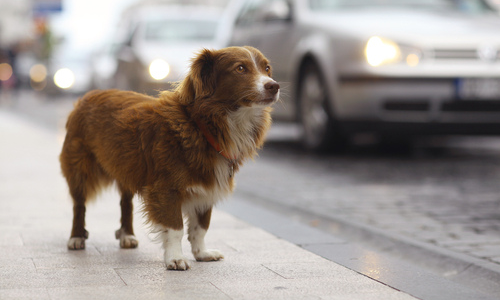
6 Tips That Will Prevent Your Pet from Becoming Lost
Ten million pets wander away from their homes every year, according to American Humane estimates. Sadly, not all of them return home. July's National Lost Pet Prevention Month is the perfect time to take a few steps to help keep your pets safe.
Use Collars and Identification Tags
If your pet never travels farther than your backyard, an ID tag may seem unnecessary. Although your cat or dog may seem perfectly content to sit near the open door while you bring in the groceries or check the mail, that may not always be the case. One day, your furry friend might make a mad dash out the door to investigate an unfamiliar animal or flee after being scared by a loud noise.
Your lost pet has a much higher chance of being reunited with you if it wears a collar with an ID tag. The tag should include your pet's name, and your name, address, and telephone number. If your cat or dog accompanies you on vacation, buy tags that list your temporary address.
Replace the collar when it becomes worn or no longer fits your pet correctly. If the collar fits properly, you should be able to slide no more than two or three fingers underneath.
Make Sure Your House and Yard Are Secure
Regular inspections of your home and yard will help you identify possible escape routes. Check fences for holes, broken slats, or leaning posts. If digging is your pet's favorite hobby, follow the ASPCA's advice and bury concrete blocks under the fence.
Invisible fences may not always keep your pet in your yard, as some pets may risk a momentary shock to cross the fence line. Keep in mind that invisible fences are designed to keep your pet in your yard but don't prevent other animals from entering.
During your inspection, look for loose or torn window or door screens. A determined pet can quickly enlarge a small hole in a screen. Doors and gates that don't latch properly are another potential danger.
Keep Pets Safe When Strangers Are in the House
Pets may be more likely to become lost when contractors, delivery people, and other strangers walk in and out of your house. Skittish pets may feel threatened by strangers and be more likely to bolt.
For safety's sake, put your pet in a quiet room and close the door if you're doing a little work on your house or expecting a delivery. Provide your furry friend with a few toys, food, and water (and a litter box if you have a cat).
Microchip Your Pet
Microchipping your pet offers a simple way to increase the chances that your pet will return home if lost. Rice-sized microchips placed just under your pet's skin contain codes that can be read with scanners at a veterinarian's office or humane society. The numerical code is linked to your contact information in the microchipping company's registry. The registry is only helpful if it contains current information. Be sure to update your contact details if you move.
Although microchips are a very effective tool, you'll still need to use a collar and ID tag. If someone in your neighborhood finds your pet, he or she probably won't have a scanner.
Use Carriers and Leashes
Carriers and leashes are a must if you'll be visiting the veterinarian's office or venturing outside your home with your pet. Even the calmest pets can become agitated when exposed to the sights, smells, and sounds at the vet's office. If you don't use a leash or carrier, your overwhelmed cat or dog may jump out of your arms the moment the door to the waiting room opens.
Obedience Train Your Dog
Dogs that respond to sit, stay, wait, come, and other commands may be less likely to wander or take off after a rabbit during your walks around your neighborhood. Training also teaches your dog the appropriate way to behave around people and other animals.
Microchipping only takes a few seconds yet offers an excellent way to protect your furry friend. If microchipping sounds like a good option for your pet, contact our office to schedule an appointment.
Sources:
American Humane: Every Day is Tag Day - Is Your Pet Protected?, 4/1/19
Petfinder: What to Do if You Lose Your Pet
ASPCA: How Many Pets Are Lost? How Many Find Their Way Home? ASPCA Survey Has Answers, 6/28/12
The Humane Society of the United States: High Tech: Identifying Lost Pets with Microchips
